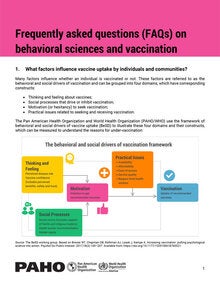Frequently asked questions (FAQs) on behavioral sciences and vaccination

|
As national immunization programs grapple with how to increase vaccine uptake for both vaccines against COVID and those that form part of the routine immunization schedule, they should consider the role of behavioral and social drivers of vaccination (BeSD), which help us understand the beliefs and experiences that influence vaccine uptake. The present document includes answers to questions submitted to PAHO about behavioral and social drivers of vaccination with the goal of helping immunization programs understand these factors; what the BeSD framework is and what its four domains – thinking and feeling, social processes, motivation, and practical issues – are; how social and behavioral data can be collected, analyzed, and used to implement and evaluate interventions to increase uptake; what tools are available to do this; the special considerations needed when considering health workers´ role in promoting vaccination; the relationship between BeSD and risk communication and community engagement (RCCE) for vaccination; and the definition and relationship between key social and behavioral terms like vaccine confidence and vaccine hesitancy. Additionally, the document presents the new spectrum on intentions toward vaccination and answers questions about how to handle anti-vaccine advocates (“anti-vaxxers”) and vaccine refusers; managing misinformation and disinformation related to vaccination and engaging in social listening; and using the BeSD framework to change risk perceptions about vaccine-preventable diseases and vaccination. Resources developed by WHO and PAHO that are related to behavioral and social drivers of vaccination are also listed and linked for easy access by the user of the FAQ document. < Back to Behavioral science: Vaccine demand and confidence |
